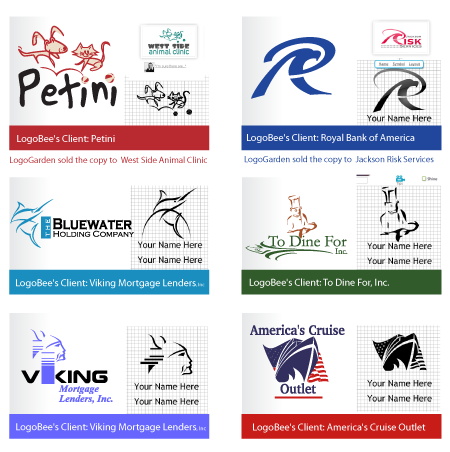The fruits of someone else’s work
November 8th, 2011
Some alleged logo design companies, such as Logo Garden, blatantly rip off logos from other logo designers and sell them as their own.

You wouldn’t steal a purse.
You wouldn’t steal a watch.
But would you steal a logo?
For “logo design company” Logo Garden, the answer, sadly, is yes. Design association AIGA.com alerts us that this company’s list of logos for sale consists primarily of stolen logos. The list of victims includes designers such as Bill Gardner and LogoBee itself. In fact, Logo Garden is not above swiping such iconic designs as the WWF panda and the famous donkey which is the symbol of the Democratic party.
According to the testimonials on LogoGarden’s website, the logos pictured above have been sold to unsuspecting and unaware clients, who showered LogoGarden with praise for cheap quality service while having no idea that the logos they were sold already belong to someone else – like the Royal Bank of America! As you can see, the logos are ever-so-slightly modified, but as Bill Gardner notes, this only incriminates the company further. The minor modifications prove that those behind this theft knew full well that what they were doing is illegal, and attempted to conceal the obvious.
The man behind this company is a certain John Williams, who also happens to be the founder of LogoYes and an award-winning designer who used to be a writer for Entrepreneur.com – which I suppose only shows how low even a respected individual can sink when money is at stake. Even assuming Williams was not directly and personally involved in the theft, he should still bear responsibility for the fact that his, and I quote, “hand-picked team of world-class logo designers” turns out to be composed primarily of charlatans and thieves, and that he’s letting this nonsense go on despite the fact that his company is pretty damn infamous by now. We aren’t talking small theft, here. Allegedly, hundreds of logos have been stolen, which comes down to thousands of dollars of product lifted by Williams’ company from other designers.
Logo Garden may be the most blatant and infamous example, but certainly not the only one: logo design theft is unfortunately common. Sad, but true: it is much harder to track theft when nothing material per se has been taken. If your purse has been stolen, you can notice it. But when logo design theft is committed, the original designer’s work doesn’t disappear from the site. For this reason, you may not find out your work has been stolen until it’s too late and you’re already engaged in a lawsuit after having unwittingly helped someone make a lot of money.
Besides, there’s a good way to protect your purse from being stolen – just keep it in a safe place. Of course there are measures that can secure your logo design as well. Sitepoint.com’s excellent article about design theft lists a few, such as disabling the option to right-click for your users, pasting transparent images over the real ones or scrambling source code. There are ways to find out your work has been stolen, and ways to deal with design theft, but none of them are flawless and some of them may have unintended side effects, such as loss of clients. It’s still worth a read, though.
The first and foremost priority as of now is still Logo Garden. Whether you are the owner of a logo or a designer of them, it is advised that you “try for free” their “do-it-yourself” section and browse their logo lists for logos that might be suspiciously similar to yours. It is notable that the WWF panda has disappeared from their site, so the company seems to not be all that oblivious to the uproar it causes. Demand the immediate removal of all your logos from their website, and make some noise, too! Either Logo Garden shall behave ethically and respect other people’s property, either we, together, will bring it down.




